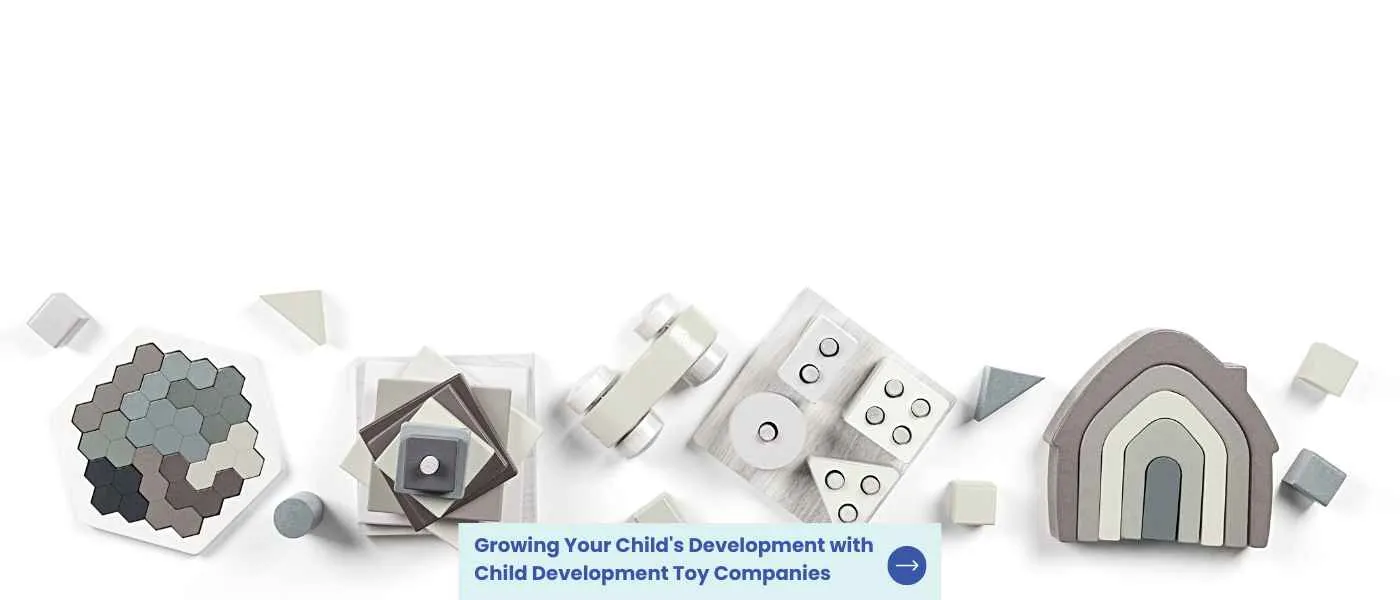Do you want to provide your children with the best toys that promote healthy development while also helping reduce waste? Toy companies making high quality educational toys have an answer: wooden toys, open-ended play and zero waste plastic free products. Not only are educational toys great for kids, but they’re also incredibly eco-friendly.
In this blog post, we’ll discuss why choosing toys made from sustainable materials using environmentally-friendly practices is a smart choice for families looking to be more sustainable and how you can find the right one for your family!
Key Takeaways on Educational Toy Brands
- Wooden toys are a great choice for families looking to invest in sustainable, durable, and safe products for their children. They can last for generations, provide hours of imaginative play, and help develop important skills like problem solving and social interaction while being non-toxic and free from choking hazards.
- When shopping for toys, it’s important to research the company and evaluate their quality and safety standards.
- By supporting sustainable toy companies, we can create a positive environment for children to learn and grow in.
Benefits of Wooden Toys
Wooden toys are a great choice for families looking to invest in sustainable, durable, and safe products for their children. They can last for generations, provide hours of imaginative play, and help develop important skills like problem solving and social interaction.
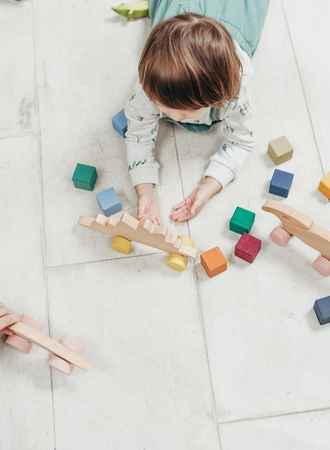
Durability
Wooden toys are incredibly durable compared to plastic alternatives. This makes them ideal for younger children who may be more prone to dropping or throwing their toys around the house. The toys that your child is playing right now will be the same toys your future children will be playing as well.
Additionally, these durable toys won’t break easily if they get stepped on or sat on by accident! As an added bonus, wood is naturally resistant to bacteria which means that it won’t harbor germs as much as other materials would.
Safety
Another benefit of wooden toys is that they are typically made from non-toxic materials such as maple or cherry wood which don’t contain any harmful chemicals like some plastics do. Furthermore, these types of woods tend to be softer than other hardwoods so there is less risk of splinters when your child plays with them.
These toys don’t have small parts that could potentially become choking hazards (like plastic figures often do), you can rest assured knowing your little one will stay safe while playing with them!
Wooden toys offer a great deal of versatility when it comes to playtime. From blocks and puzzles to trains and cars, there is something available for every age group and interest level. Not only do these kinds of items encourage creativity, but they also promote fine motor skill development which makes them perfect gifts for toddlers up through preteens.
Additionally, since many sets come with multiple pieces, children can mix-and-match different components over time so that their toy collection never becomes boring.
When choosing safe baby toys, consider the age appropriateness of the toy and whether it poses any choking hazards. Look for age-appropriate toys made from non-toxic materials and avoid those with sharp edges or small parts that can be easily broken off. Additionally, it’s important to follow all recommended safety guidelines and supervise your child during playtime.
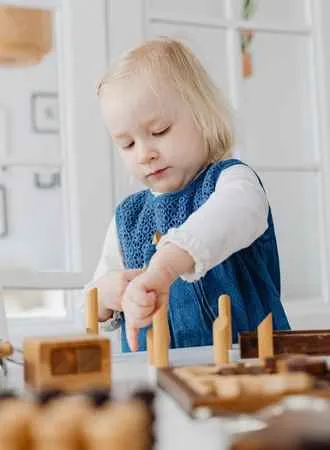
Open-Ended Play
Open-ended and imaginative play is an essential part of childhood development. It encourages children to use their imaginations and explore the world around them, helping them develop problem solving skills, creativity, and social interaction with other children.
Imagination and Creativity
Open-ended play allows children to express themselves in a creative way. They can create stories or scenarios that are unique to them without being limited by rules or instructions. This type of play helps build confidence as they learn how to think outside the box and come up with new ideas on their own.
Problem Solving Skills
Through open-ended play, kids learn how to work through problems independently. They practice trial and error while trying out different solutions until they find one that works for them. This teaches valuable life skills such as critical thinking, executive functioning, resilience, perseverance, and resourcefulness which will help them succeed later in life.
Open-ended play encourages social interaction between children of all ages, as it promotes creative thinking and cooperation among peers or the whole family who have different ideas about what should happen next in the game or story they are creating together.
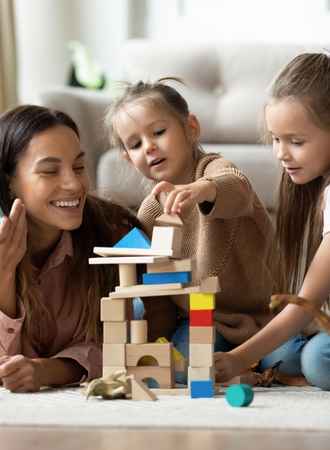
Language and Communication Skills
Working towards a common goal helps to foster communication skills such as listening carefully to others’ opinions before making decisions collectively and respecting each other’s contributions regardless of their size.
Fine Motor Skills
Classic toys such as wooden blocks, rattles, sensory toys and musical toys keep little kids and babies entertained while providing opportunities for developing their fine motor skills and hand-eye coordination.
Social and Emotional Skills
Toys are a great choice for parents who want to promote social-emotional development in their children. These toys provide opportunities to learn important social skills such as communication, cooperation, and empathy while keeping the child engaged.
For example, wooden blocks are a classic toy that has been popular for generations. They are great for developing social-emotional skills because they encourage children to work together to build structures, problem-solve when things don’t go as planned, and communicate effectively to achieve their goals.
Another good example are wooden puzzles are another great option for developing social-emotional skills in children. They require children to use their analytical thinking skills to figure out how to fit different pieces together, which can be a fun and rewarding experience.
When children work on puzzles together, they learn to communicate effectively, share ideas, and work as a team to achieve a common goal.
Zero Waste Plastic Free Products
Going plastic free is an important step towards reducing waste and protecting the environment. These toys make for the best gifts and a perfect introduction to sustainable living in a cost-effective way. Parents can spend quality time with their kids by choosing eco-friendly materials, reusable packaging options, and sustainable manufacturing practices when shopping carefully-selected toys of the highest quality for their children.
Eco-Friendly Materials
Many toy companies, particularly Danish toys companies, are now offering toys made from natural materials such as wood, bamboo, rubberwood, natural beech, cotton, wool, bamboo or other plant fibers. These materials are renewable resources that don’t require petroleum to produce and they biodegrade easily in landfills or compost piles.
Many of these materials have a longer lifespan than traditional plastics which helps reduce the amount of waste produced over time.
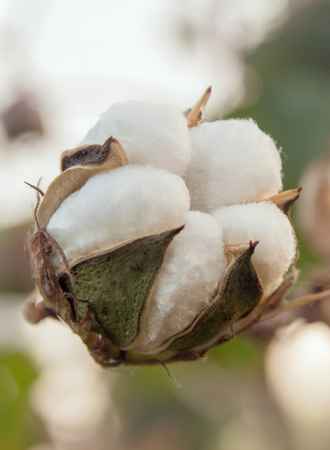
Reusable Packaging Options
Some toy companies offer reusable packaging solutions such as cardboard boxes with handles that can be used to store toys after purchase or cloth bags that can be reused multiple times before needing to be replaced. This type of packaging reduces the amount of single use plastics entering our landfills while also providing convenient storage solutions for families who want to keep their homes organized without creating more clutter.
Toy companies should strive to use sustainable manufacturing practices, such as using recycled paper in product boxes or utilizing solar energy during production processes, whenever possible. Doing so helps reduce their carbon footprint while still producing quality products that meet safety standards and last through years of playtime.
Finding the Right Toy Company for Your Family
When it comes to finding the right toy company for your family, research is key! It’s important to understand a company’s values before making a purchase. This includes evaluating quality and safety standards as well as understanding return policies and warranties.
Researching Companies and Their Values
Before committing to any particular toy company, take some time to research their values. Are they committed to sustainability? Do they use eco-friendly materials? Are their products ethically sourced? These are all questions you should be asking yourself when researching companies.
Additionally, look into customer reviews of the product or service you’re considering buying from them – this can give you an idea of how reliable they are in terms of delivery times and customer service.
Evaluating Quality and Safety Standards
When shopping for toys, it’s essential that you evaluate the quality and safety standards set by the manufacturer or retailer. Make sure that all products meet local and international standards such as ASTM International (formerly known as American Society for Testing Materials) which sets voluntary health & safety guidelines for children’s toys worldwide.
Also consider whether there are any age restrictions on certain items – these can help ensure your child is playing with safe products appropriate for their age group.
Understanding Return Policy
Before making a purchase from any company, make sure to understand their return policy. This will save you time in the event that something is wrong with your order or it does not meet expectations upon arrival. Additionally, many companies offer warranties on certain items; therefore, it is important to read up on those as well in case something goes wrong after the purchase has been made.
Finding the right toy company for your family is an important step in ensuring that your children get quality, safe toys that promote healthy development. In the next section, we’ll look at how to evaluate a company’s environmental values and practices.
How to Choose Right Toys From Eco-Friendly Toy Companies
As a modern parent, it’s normal to feel overwhelmed by the sheer variety of new toys available in the market today. However, choosing the right toys for your children is crucial for their emotional, social, and cognitive development. It can also impact their interests, creativity, and future learning. Therefore, it’s important to make informed decisions when selecting toys that align with the needs and interests of your child.
- Consider the child’s age and developmental stage when selecting bath toys, as toys that are too advanced or too simple may not hold their attention or be safe for them to play with. Look for toys made from non-toxic materials that are easy to clean and won’t harbor mold or bacteria, as bath toys can quickly become breeding grounds for germs. Opt for toys that are designed to promote learning and exploration, such as toys that encourage sensory development or teach cause-and-effect, to make bath time fun and educational.
- Buy play mats and activity gym that come with toys specially designed to keep the tiny fingers and hands of your babies active. Most of these toys are BPA-free and feature different shapes and fun animals for shape recognition and bright colors for color recognition.
- If you have a toddler, choose toys you can quickly toss onto your diaper bag so you have something to keep your child entertained wherever you go.
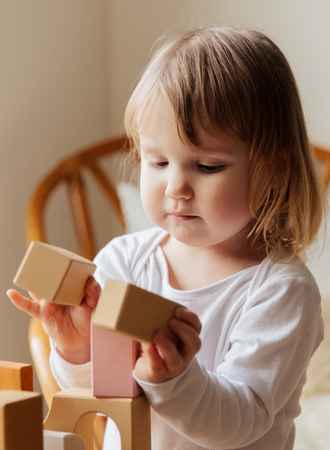
How to Support Toy Makers Making Child Development Toys
Shopping Locally and Ethically
Supporting ethical toy companies can start with shopping locally. This means buying from small businesses in your area that are dedicated to producing quality, safe toys for children. Shopping ethically also includes looking into the materials used to make the toys, such as wood or plastic-free options. Doing this helps ensure that you’re supporting a company that is using sustainable practices and not contributing to environmental damage.
Donating to Charities or Nonprofits
Another way of supporting these types of companies is by donating money or time to charities or nonprofits that focus on providing resources for children’s education and playtime activities. These organizations often partner with local toy stores and other businesses who specialize in creating educational toys, puzzles, games, books, etc., so they can provide them at no cost to families in need.
One of the best ways to support plastic-free toy companies is by sharing positive experiences with others who may be interested in investing. This can be done through word-of-mouth recommendations or online reviews on websites such as Amazon or Etsy. By spreading the word about great products, more people will likely invest their money into these kinds of items.
FAQs on Educational Children’s Toys Brands
What Are the Best Toys for Cognitive Development?
Educational toys are great for cognitive development, as they encourage open-ended playtime and creativity. Puzzles and building blocks help children learn problem solving skills, while shape sorters teach them to recognize shapes and colors.
For younger children, wooden stacking toys can help develop fine motor skills. Natural materials like wood also provide a sensory experience that helps stimulate the senses. Finally, zero waste plastic free products offer an zero waste alternative to traditional plastic toys which are often made with toxic chemicals.
All of these toys can help children develop their cognitive skills while providing a safe and environmentally-friendly environment.
What Are Montessori Approved Toys?
Montessori approved toys are designed to promote open-ended playtime and exploration. They are typically made of natural materials such as wood, cotton, wool or silk. These toys are often simple in design with no batteries or electronic components.
Montessori approved toys encourage children to use their imagination and develop problem solving skills while playing. They also help foster a child’s independence by allowing them to explore the world around them without adult intervention.
The goal is for children to learn through self-directed activities that stimulate all areas of development including physical, cognitive, social and emotional growth.
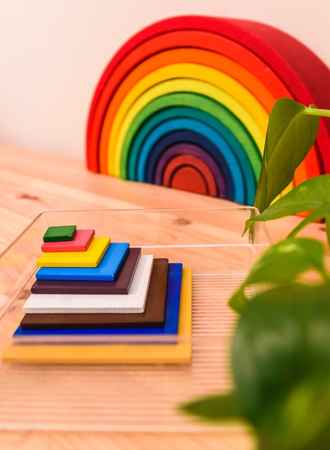
Is Lovevery a Montessori?
No, Lovevery is not a Montessori like those made by Monti Kids. Lovevery offers wooden toys and open-ended playtime for families with children, but it does not offer the same comprehensive educational approach that Montessori schools provide. Instead, Lovevery focuses on providing sustainable products that are free of plastic waste to help families reduce their environmental impact. Additionally, they also strive to create meaningful experiences through playtime with their products.
Are Toys Made by Hape Toys Any Good?
Hape Toys are known for their high-quality and sustainable materials, such as bamboo, wood, and water-based paints. They prioritize safety and durability in their design and production process, resulting in toys that can withstand years of play and can be passed down to future generations. Many of their toys also promote learning and development in children.

